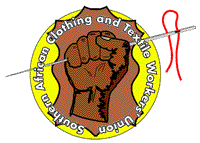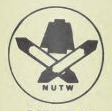Related Research Articles

The World Federation of Trade Unions (WFTU) is an international federation of trade unions established in 1945. Founded in the immediate aftermath of World War Two, the organization built on the pre-war legacy of the International Federation of Trade Unions as a single structure for trade unions world-wide, following the World Trade Union Conference in London, United Kingdom.

The Southern African Clothing and Textile Workers' Union (SACTWU) is the biggest union in the South African clothing, textile, footwear and leather industry, with more than 100 000 members. It negotiates wages for the vast majority of workers in these industries in South Africa, with the collective bargaining agreements covering over 150 000 workers.
Trade unions in South Africa has a history dating back to the 1880s. From the beginning unions could be viewed as a reflection of the racial disunity of the country, with the earliest unions being predominantly for white workers. Through the turbulent years of 1948–1991 trade unions played an important part in developing political and economic resistance, and eventually were one of the driving forces in realising the transition to an inclusive democratic government.

The Federation of South African Trade Unions (FOSATU) was a trade union federation in South Africa.

Ebrahim Patel is a South African politician and former trade unionist who has been Minister of Trade, Industry and Competition since May 2019. He previously served as Minister of Economic Development from 2009 to 2019.
Clothing industry or garment industry summarizes the types of trade and industry along the production and value chain of clothing and garments, starting with the textile industry, embellishment using embroidery, via the fashion industry to apparel retailers up to trade with second-hand clothes and textile recycling. The producing sectors build upon a wealth of clothing technology some of which, like the loom, the cotton gin, and the sewing machine heralded industrialization not only of the previous textile manufacturing practices. Clothing industries are also known as allied industries, fashion industries, garment industries, or soft goods industries.
The South African Railways and Harbours Union was formed by black workers of the South African Railways and Harbours Administration after they had been expelled from the National Union of Railway and Harbour Servants.
The Council of Non-European Trade Unions (CNETU) was a national trade union federation bringing together unions representing black African workers in South Africa.
The South African Congress of Trade Unions (SACTU) was a national trade union federation in South Africa.

Viola Hashe (1926-1977) was a teacher, anti-apartheid activist and trade unionist in South Africa. Hashe was also blind.
Lucy Buyaphi Mvubelo was a South African trade unionist.
The Amalgamated Clothing and Textile Workers' Union of South Africa (ACTWUSA) was a trade union representing workers in the garment and fabric industries in South Africa.
The National Union of Garment Workers (NUGW) was a trade union representing clothing workers in South Africa.

The National Union of Textile Workers (NUTW) was a trade union representing workers in the textile industry in South Africa.
The National Union of Clothing Workers (NUCW) was a trade union representing garment workers in South Africa.
The Garment Workers' Union of the Western Province (GWU-WP) was a trade union representing workers in the clothing industry in the Western Cape Province of South Africa.
The Garment Workers' Industrial Union (GWIU) was a trade union representing clothing workers in South Africa.
The Garment Workers' Union of South Africa (GWU) was a trade union representing workers in the clothing industry in South Africa.
The Textile Workers' Industrial Union (TWIU) was a trade union representing workers in the textile industry in South Africa.
John Anthony Copelyn is a South African businessman and former trade unionist who has been chief executive officer of Hosken Consolidated Investments (HCI) since 1997. He entered the company as the head of the investment wing of the Southern African Clothing and Textile Workers Union (SACTWU), where he was formerly general secretary.
References
- ↑ Hirson, Baruch (1989). Yours for the Union. London: Zed Books. pp. 40–42. ISBN 086232369X.
- ↑ "Gana Makabeni". South African History Online. Retrieved 3 April 2021.
- ↑ "Viola Hashe". South African History Online. 23 January 2013. Retrieved 3 September 2016.
- ↑ Strydom, Irene; Coetzer, Pieter (2012). "Lucy Mvubelo's role in the South African Trade Unions, 1960-1974". Journal of Contemporary History. 37.
- ↑ "A brief history of SACTWU". SACTWU. Retrieved 4 March 2021.[ permanent dead link ]